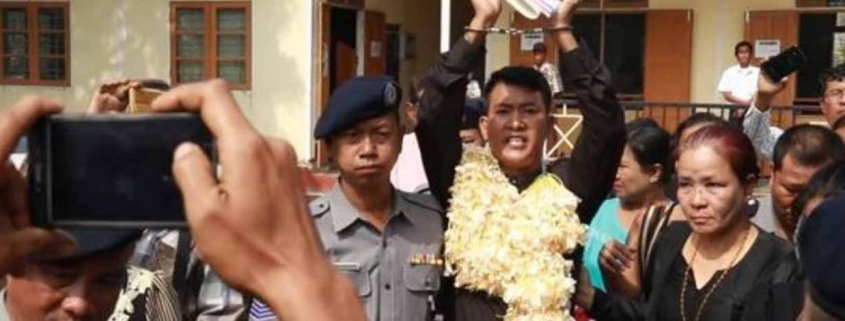Rights Groups Slam Jailing of Ex-Child Soldier for Telling His Story
By LAWI WENG 3 April 2018
More than 150 rights groups have asked the government and the Myanmar Army (or Tatmadaw) to release a former child soldier who was last month sentenced to two years in prison with hard labor for discussing with the media his forced recruitment into the army and subsequent history of legal problems.
The rights groups issued a statement saying that Aung Ko Htwe, now 26, was only exercising his rights and did nothing wrong when he related to the media his experiences as a child soldier and his later problems with the law.
In 2005, at the age of 14, Aung Ko Htwe was abducted at Yangon’s central railway station and forcibly recruited into the Tatmadaw, according to his family. Two years later, he escaped with two others. In the process of escaping, they killed the owner of a motorbike while stealing it. One of the three reportedly strangled the victim, though Aung Ko Htwe later said he was not involved in the killing.
The trio was charged with murder and found guilty; all received death sentences, though Aung Ko Htwe was just 16 at the time. In 2013, his sentence was commuted to life imprisonment. Aung Ko Htwe was eventually released in July 2017 after serving 10 years in jail.
Shortly after his release, he gave an interview to Radio Free Asia (RFA) describing his experiences. The army charged him under Article 505 (b), a section of Myanmar’s criminal code related to incitement. He was eventually sentenced to two years in prison.
“We rights groups condemn the decision to sentence him to prison. The punishment violates his rights,” the organizations said in a statement issued on April 1.
Going further, the groups asked the government and the army to release him unconditionally and drop additional charges that he is facing. Police added an extra charge under Section 7 of a 2010 law that prohibits destruction of the Union seal. The offense is punishable by three years in prison.
Aung Myo Min, the director of Equality Myanmar, one of the 154 right groups that signed the statement demanding Aung Ko Htwe’s release, said: “He has done nothing wrong, but they [the government]used the law to punish him.”
Myanmar ratified the UN Convention on the Rights of the Child in 1991. Despite having agreed not use underage soldiers, however, the Tatmadaw recruited Aung Ko Htwe.
“The government must learn from Aung Ko Htwe’s experiences in order to prevent this from happening again. The government needs to find a solution, and cooperate with Aung Ko Htwe. This would be the best way to have a really strong law,” U Aung Myo Min said.
U Aung Myo Min said, “Our country has some laws that are used to punish citizens. These laws are used selectively. [Authorities] act like cats, using their claws when they need to hunt for prey, but retracting them when they don’t need them.”
Genuine rule of law is about protecting the rights of citizens, but in Myanmar, the laws are not used to protect citizens, according to the right groups.
Following the RFA interview, Aung Ko Htwe was sentenced to six months’ jail for contempt of court. He refused to appear in court following this, but police forced him to appear. The court finally sentenced him to two years’ imprisonment last month.
The police later brought additional charges for which he faces additional sentencing in future.
The rights groups criticized the lack of rule of law in the country, as increasing numbers of people are sent to prison on contempt charges after criticizing the courts.
“The government first needs to consider whether the critics’ arguments are valid or not. The critics point out incorrect rulings by the courts. If the courts do not reform, rule of law will not be upheld, and the people will not respect the courts anymore,” U Aung Myo Min said.



